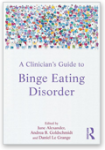Eating disorders are NOT rare – obesity v. eating disorders
Eating disorders are NOT rare – obesity v. eating disorders
“Concerns about disordered eating in children and adolescents should not preclude appropriate action on childhood obesity.”
Extract from Medical Journal of Australia

Chevese Turner is a contributor to A Clinician’s Guide to Binge Eating Disorder.
I share the concerns of eating disorder advocate, Chevese Turner, about an article published in the Medical Journal of Australia. The article is titled: Childhood obesity in Australia remains a widespread health concern that warrants population-wide prevention programs.
Chevese, CEO and Founder of the Binge Eating Disorder Association (BEDA) in the United States, states:
“This irresponsible statement should be addressed. I know that many “obesity experts” feel the same here in the States. One of the things that we are beginning to say is ‘Eating Disorders are NOT rare’. The numbers back up this statement and are growing.
“I am just exhausted by being told continually that obesity is more important because it is so prevalent and eating disorders are so rare. I don’t think that 25 million adults (number does not include children/adolescents) in the US alone is rare. These folks are sorely misinformed.”
Figures on eating disorder incidence in Australia are equally compelling. We need to give them more voice. A lot more voice. Why? Because the price of being complacent is too great.
In 2012 Deloitte Access Economics was commissioned by The Butterfly Foundation to assess the economic and social costs of eating disorders in Australia. The work of the Deloitte team was supported by an advisory panel of experts in eating disorders, mental health, and population health.
The resultant report , “Paying the Price: economic and social impact of eating disorders” is the first of its kind for eating disorder in Australia, identifying prevalence, financial costs, and the productivity and societal impact of the many Australians suffering these mental illnesses. The figures in the report are estimated to be conservative.
- There are an estimated 913, 986 people in Australia with an eating disorder in 2012 or around 4% of the population. Females comprise around 64% of the total. In contrast the last official estimate by the Australian Institute for Health and Welfare suggested that there were only 23,464 people with eating disorders in Australia in 2003 (based on a small survey of Swiss schoolgirls).
- There is also a substantial imbalance between the reported estimates of mortality from eating disorders and evidence from research: the latest meta-analysis of epidemiological studies from the published literature (the gold standard of health research) indicates that mortality rates are almost twice as high for people with eating disorders and 5.86 times higher for people with Anorexia Nervosa compared to those without the conditions. On this basis there were an estimated 1,829 deaths from eating disorders in 2012.
- The total socio-economic cost of eating disorders in Australia in 2012 is $69.7 billion, including health system costs of $100 million.
- The productivity costs are $15.1 billion which are similar in impact to anxiety and depression. Included in this cost is $2 billion due to lifetime earnings lost for young people who die from an eating disorder.
- The “burden of disease” from eating disorders is estimated as $52.6 billion, calculated by multiplying the years of healthy life lost (measured in disability adjusted life years or DALYS), by the value of a statistical life year (VSLY) as recommended by the Department of Finance and Deregulation. The estimate is comparable, although slightly larger, than the estimated value of the burden of disease for anxiety and depression of $41.2 billion (Access Economics, 2010).





